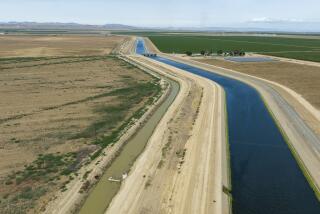No, California’s environmental laws probably won’t block Trump’s border wall
- Share via
Reporting from Sacramento — With California’s political leaders in full resistance mode over President Trump’s executive order to build a wall on the Mexican border, Senate leader Kevin de León, Lt. Gov. Gavin Newsom and others have floated an idea to try to stop it: the state’s famously stringent environmental laws.
“If there’s severe environmental impacts on our border, we’re going to seriously look into it,” De León, a Los Angeles Democrat, told reporters at a Wednesday news conference in Sacramento.
But legal experts say any effort to use state and federal environmental rules to block the wall faces extremely slim chances of being successful. Under the U.S. Constitution, the federal government has wide latitude to preempt state and local laws, especially in cases of immigration and national security. And a decade-old federal court decision issued during a previous iteration of border fence construction already allowed the government to waive environmental laws to build.
“It’s quite a long shot,” Sean Hecht, co-director of the Emmett Institute on Climate Change and the Environment at the UCLA School of Law, said of any potential environmental lawsuit to stop the wall.
Trump has yet to reveal many details of his border wall plan, including whether California will see any new construction. Much of California’s 140-mile border with Mexico already is fenced, with the San Diego-Tijuana area the most fortified.
Most major development projects in the state have to run through a thicket of laws designed to preserve the state’s natural beauty — especially in sensitive areas — notably the California Environmental Quality Act and the Coastal Act. The federal government has the National Environmental Policy Act and other environmental laws that would also typically apply in the border area. Newsom referenced these laws when asked in a recent interview how the state might block the wall.
“There are all kinds of obstructions as it relates to just getting zoning approval and getting building permits,” Newsom said. “All those things could be made very, very challenging for the administration.”
Newsom has since asked the State Lands Commission, which regulates environmental matters, to take a deep look into regulatory and jurisdictional issues surrounding the building of a wall in California, a spokesman for Newsom said. Any formal action by the commission to block the wall would require a vote.
In 2005, Congress gave the federal government broad authority to waive all federal and state environmental laws to build a border fence. The Department of Homeland Security later invoked that authority to build a section of the fence outside San Diego. Environmental groups sued when the department used the same rationale for a section of the fence in Arizona. The federal government won the case, and in 2008 the U.S. Supreme Court declined to hear an appeal.
That outcome makes it hard to see a similar argument against a wall winning this time, said Ethan Elkind, director of the climate program at UC Berkeley’s Center for Law, Energy & the Environment. But Elkind said he wouldn’t be surprised if state officials or environmental groups try again.
“Environmentalists really don’t have much to lose,” Elkind said. “They could be worried about setting a negative precedent, but there already are a lot of negative precedents out there.”
Damon Nagami, a California-based senior attorney with the Natural Resources Defense Council, said his organization is looking for ways to legally attack the border wall and also plans to feed ideas to state lawmakers. Nagami said he was working with state Sen. Ricardo Lara (D-Bell Gardens), who has introduced a bill that aims to force a border wall to a statewide public vote.
But should it pass, Lara’s legislation faces the same hurdle as the existing federal and state environmental laws, said Rick Frank, director of the California Environmental Law and Policy Center at UC Davis.
“I don’t think it would have any binding effect on what the federal government would choose to do,” Frank said.
ALSO
Trump’s immigration orders will boost deportations. What the wall amounts to is less certain
California can stop the border wall with environmental lawsuits, Lt. Gov. Gavin Newsom says
Updates on California politics
More to Read
Get the L.A. Times Politics newsletter
Deeply reported insights into legislation, politics and policy from Sacramento, Washington and beyond. In your inbox twice per week.
You may occasionally receive promotional content from the Los Angeles Times.











